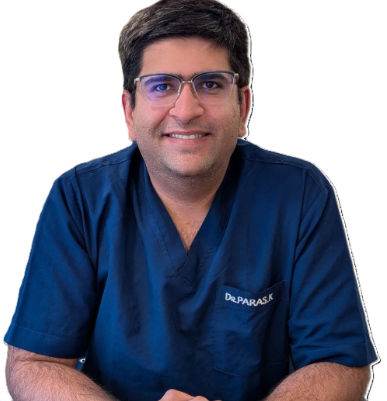Diagnostic Test for Cataract - Investigation and Self Test

Quick Summary
- Cataract is a common eye condition that affects millions of people worldwide.
- Cataract can be treated with surgery, but it's important to have an accurate diagnosis before pursuing any treatment options.
- There are a number of diagnostic methods used to diagnose cataract, including a self-test for cataract.
Cataract is a common eye condition that affects millions of people worldwide. As we age, the lenses in our eyes can become cloudy, leading to blurred vision and difficulty seeing clearly. However, cataract can also develop in younger people due to injury, genetics, or other medical conditions. The good news is that cataract can be treated with surgery, but it's important to have an accurate investigation of cataract before pursuing any treatment options.
In this blog post, we'll dive into the diagnostic methods used to accurately diagnose this condition, including the self-test for cataract. By the end of this post, you'll have a comprehensive understanding of cataract and be better equipped to take the necessary steps to manage this condition.Who Needs a Diagnostic Evaluation of Cataract?
Most cataract occur as a result of old age. Therefore, the following individuals must make it a note to have their eyes evaluated with a cataract examination:
- Individuals over the age of 40 must get tested for cataract at least every 2 years, even if they do not experience any symptoms.
- Individuals over the age of 65 must get their eyes checked for cataract at least once every year.
- Individuals with health issues such as diabetes, high blood pressure and a family history of cataract or glaucoma.
- Lastly, individuals suffering from the common symptoms of cataract must visit an ophthalmologist to evaluate their eyes immediately.


Importance of Cataract Diagnostic Evaluation
Getting a diagnostic test for cataract done at the right time benefits individuals in more ways than one.
- An early look at the cataract can get the eye healed via surgery without much damage to the eye vision and with minimal discomfort faced by the patients in the initial stages of their symptoms.
- Moreover, in cases of children, the earlier a cataract is detected in their eyes, the higher their chance of better long-term vision.
- In cases of newborns, the doctors conduct a screening test to evaluate the child’s eye for cataract. This becomes helpful in detecting any issue at the very early stage itself.
Diagnostic Tests for Cataract
Cataract are diagnosed by ophthalmologists and optometrists after a thorough eye exam. The healthcare professional will carefully check the eyes to detect cataract and evaluate their severity.
However, one can also diagnose cataract at home by undertaking a self-test for cataract. The investigation of cataract that are performed to diagnose include the ones listed below:
Self-test for Cataract
Early detection is critical to living a life with great vision. Cataract can save an individual's eyesight if diagnosed at the right time. Therefore, people can take up a few self-tests for cataract at home. Some of these tests are as follows.
- One self-test for cataract is a visual acuity test. This involves covering one eye at a time and reading a standard eye chart from a distance of 20 feet. If the individual notices any blurriness or difficulty reading the chart, it could be a sign of cataract.
- Another self-test is a contrast sensitivity test. This involves looking at a grid of black and white lines with varying shades of grey. If the individual notice that the lines are less visible or harder to distinguish, it could indicate cataract.
People should also look for the following symptoms as a self-test for cataract:
- Individuals may find it hard to see clearly at night.
- Individuals may experience ‘halos’ around light sources.
- A double or ghost vision wherein the individuals may see their vision overlapping or duplicating.
- Colour reception appears faded.
However, it's important to remember that a self-test is not a substitute for a proper diagnosis from an eye doctor.
Professional Diagnosis for Cataract
If an individual suspects having cataract, it's important to seek professional help from an eye doctor who can perform a thorough investigation of the symptoms. Below mentioned are some of the common investigation of cataract.
- Retinal Exam: The doctors lubricate the eyes using drops to dilate the pupils, following which an eye examination is done through an ophthalmoscope.
- Visual Acuity Test: Through the visual acuity test, the eyesight of the patient is measured. During this test, the patient is shown a chart, which includes a series of alphabets. Each eye is tested at a time while the other is covered. It determines the impairment in the vision of a patient if any.
- Slit-lamp Examination: The slit-lamp allows the doctors to view the lens, cornea and iris of a patient’s eye. This high-intensity light that enters the eye of the patient through the slit lamp enables the doctors to view the smallest abnormalities in the eye of the patient.
- Applanation Tonometry: Applanation Tonometry is done through various devices wherein the doctors check the pressure of fluids in a patient’s eye.
- Contrast Sensitivity: The contrast sensitivity function testing is a cataract diagnostic test that uses a learning algorithm. It improvises the decision-making process of the surgery to be conducted for cataract. This is typically conducted in patients who experience visual subjectivity despite good visual acuity.
- Pupil Dilation: The dilated eye exam or pupil dilation testing for cataract is performed by ophthalmologists to enhance the size of the pupil to carefully and accurately examine the state of the cataract.
- Potential Acuity Test: Before a surgical procedure, especially cataract surgery, it is occasionally appropriate to evaluate one's potential vision with a potential acuity measurement. The potential acuity metre (PAM) is intended to project an eye chart right onto the retina. This eliminates interference from the clouded lens during the visual acuity test done by the examiner.
- Biometry Tests: The biometry test is conducted by doctors to measure the size of the eye. It is performed to estimate the power of the IOL or the intraocular lens implants needed for the surgery.
- Colour Vision Test: The colour vision test is conducted before (and after) a cataract surgery. It is performed to analyse the general impact of the colour vision of the patient due to cataract. It is done using an anomaloscope.
- Computerised Optic Disc Imaging and Nerve Fibre Layer Analysis: Computerised optic disk imaging and nerve fibre layer analysis is conducted by doctors to assess the condition and damage done to the optic nerve of the patient due to the presence of cataract. It is a test typically conducted to assess the presence of glaucoma.
- Ocular Coherence Tomography (OCT): The OCT is conducted to detect any macular lesions in the eye of the patients.
Things Doctors Ask During Investigation of Cataract
An eye specialist must properly evaluate the condition before concluding or referring to any treatment. There are various things doctors ask their patients during the diagnostic evaluation of cataract. A few of those requirements are listed below:
- Patient’s Medical History: This may include the family's medical history and any ongoing diseases, the prescribed medications (if any) the patient is on, and any other medical conditions such as diabetes, high blood pressure, smoking, etc.
- Patient’s Visual Health History: This includes questions relating to a family history of eye-related illnesses such as Glaucoma, the power of the patient’s eye, any previous eye surgeries or treatments, etc.
- Other questions include symptoms, when they began, experiences in bright and low light, whether the patient suffers from inflammation, whether it is difficult to view colours, etc.
What if the Cataract Test is Positive?
In case the patient’s cataract test is positive, they can move on with the treatment methods advised by their doctors in-charge, depending on the severity of the cataract. Given below are some of the surgical treatment options for patients who received a positive result after a diagnostic evaluation of cataract:
- Extracapsular Surgery
- Phacoemulsification
- Femtosecond Laser
- IOL or Intraocular Lens
Takeaway
The aforementioned information aims to spread awareness about the growing problem of cataract. Investigation of cataract can be done through a self-test for cataract by looking out for some of the common symptoms discussed in this blog.
Additionally, the possible queries by a doctor, the importance of an early diagnosis, how to proceed in case of a positive cataract test, etc. have been covered too. People must take preventative measures to avoid the possibility of contracting the disease. Some preventive measures include reducing the usage of alcohol, quitting smoking, holding regular eye exams and following a healthy diet.
For more information on cataract and their diagnosis, visit HexaHealth now to get consultations from the top doctors in the country. Furthermore, the platform also provides you with assistance in insurance approval and post-surgery care.
Suggested Reads
Frequently Asked Questions
What is the most common method of investigation of cataract?
Can I do a self-test for cataract?
What do ophthalmologists suggest for the diagnostic evaluation of cataract?
Which is the safest cataract test?
What tests are used to diagnose cataract?
Medical professionals diagnose cataract by various diagnostic techniques depending on the severity of the patient’s complaint. For the initial stages, doctors use four procedures, which include — the visual acuity test, the retinal exam, applanation tonometry and the slit-lamp magnification test. Other tests include the OCT test, contrast sensitivity test, colour vision test, biometry test, etc.
Which is the most reliable and accurate diagnostic test for cataract?
What tests are done before cataract surgery?
How is a cataract examination done?
A cataract is evaluated by an ophthalmologist using the following procedure:
- Visual Acuity Test: To check the eyesight of the patient.
- Retinal Exam: Here, the doctors apply drops in the patient's eye to widen their pupils.
- Slit-lamp Test: After the retinal exam, the doctors check the eye at a microscopic level through the slit-lamp microscope.
- Applanation Tonometry: To check the fluid pressure of the eye of the patient.
How long does diagnostic evaluation of cataract take?
Is there any blood test for cataract surgery?
Can a medical test be done after a cataract?
How to test eye cataract at home?
A few ways to check for cataract at home would be to notice the following symptoms:
- Clouded layer on the lens of the eye
- Poor night vision
- Bright colours may seem faded
- Halos around light sources
- Sensitivity towards the light
Which diagnostic technique is used to confirm the location and extent of cataract?
Can a normal eye test detect cataract?
How much time does the surgery of a cataract take?
How long does it take for cataract examination reports?
What is the cost of the diagnostic evaluation of a cataract?
Are there any diagnostic tests done post-cataract surgery?
It is essential to partake in regular eye check-ups, even after the cataract surgery, to maintain eye health. A general follow-up is typically done about 2 weeks post the cataract surgery to see the eye condition and get prescription glasses if required.
Clinics also take an evaluation about 2 months after the surgery as a precautionary way to check the eye condition.
Can medical test be done after cataract?
How to test eye cataract at home?
While there are a few self-tests that can be done at home to determine if you may be experiencing symptoms of cataract, it's important to note that a proper diagnosis can only be made by an eye doctor. One self-test you can do is a visual acuity test, which involves reading a standard eye chart from a distance of 20 feet with one eye covered at a time.
What tests are used to diagnose cataract?
References
All the articles on HexaHealth are supported by verified medically-recognized sources such as; peer-reviewed academic research papers, research institutions, and medical journals. Our medical reviewers also check references of the articles to prioritize accuracy and relevance. Refer to our detailed editorial policy for more information.
Last Updated on: 27 March 2023
Reviewer

Dr. Aman Priya Khanna
MBBS, DNB General Surgery, FMAS, FIAGES, FALS Bariatric, MNAMS General Surgery
13 Years Experience
Dr Aman Priya Khanna is a highly experienced and National Board–Certified Laparoscopic, GI, and Bariatric Surgeon with over 13 years of clinical expertise.
He is widely regarded as one of the best bariatric surgeons in Ahmedabad, ...View More
Author

She is an accomplished new-age professional who has interviewed prominent personalities such as Bhaichung Bhutia, G. Sathiyan, Shashi Tharoor, etc. A content writer interested in health communication, graphic desi...View More
Expert Doctors (10)
NABH Accredited Hospitals (5)
Latest Health Articles
Related Treatments




























 Open In App
Open In App